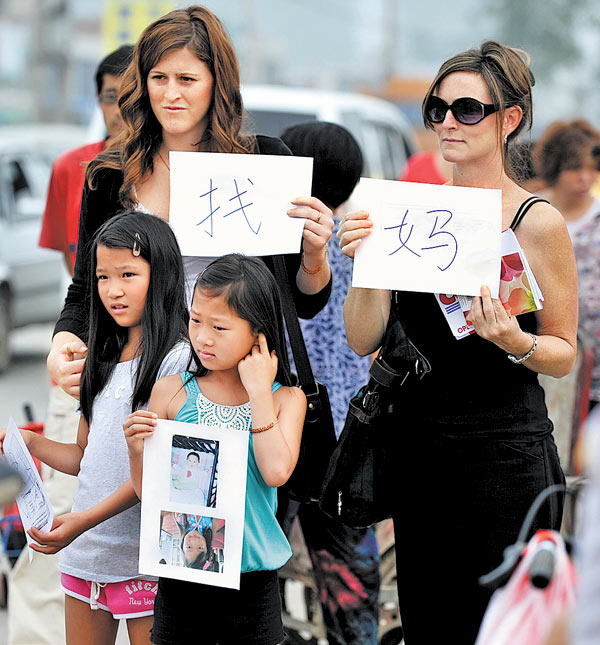China leads way on US adoptions
Updated: 2016-04-18 02:28
By Hezi Jiang in New York and Luo Wangshu in Beijing(China Daily)
|
|||||||||
 |
|
A girl identified only as Madison (front right) and her US mother (back right) returned to Anhui looking for the girl's biological mother in July 2012. Bian Shipeng / For China Daily |
International adoption of baby girls from China started to slow in 2006 when there were fewer infant orphans, and the ones that were available always went for domestic adoptions first.
Shannon Phillips, promotions and outreach director at Great Wall China Adoption, a nonprofit organization that has matched more than 9,000 Chinese children with families in the US, said, "China's waiting program for a child is getting more and more popular."
Under the program, which also exists in some other countries, Chinese orphanages identify children with special needs. Many of these children are being adopted by Western families.
Chuck Johnson, president of the National Council for Adoption, based in Virginia, US, said: "China has been very innovative in identifying children with special needs. In other countries, you really don't know where kids are and you don't know their status.
"China systematically identifies special needs children faster than it did previously, and they become available for adoption. It has also allowed US agencies to partner with orphanages to find families with special needs children.
"I can talk to a family today, they can pick out their child and they will be home this time next year with the child," Phillips said.
Johnson also said the number of foreign adoptions by US families has continued to fall because some countries have been told by the US government that they must improve child welfare to meet the standards for adoption. The US has halted adoptions from Cambodia and Guatemala because of fraud.
"China has the strongest oversight for all orphans. There is a very strong authority that monitors it. Such oversight and protection ... aren't always in place in other countries," Johnson said.
Related Stories
Adoptions approved for abduction victims 2015-09-18 07:40
Nation still No 1 for US adoptions 2015-04-03 07:31
China still No 1 for US adoptions 2015-04-02 11:06
Vietnam and US to resume adoptions 2014-09-13 07:44
Registration of foreign adoptions 2014-01-21 15:42
Today's Top News
Embryos growing in space a 'giant leap'
Russia to defend regional security jointly with China
Passage to piraeus
In the hall of the great frescoes
World Bank joins AIIB on financing for joint projects
GM seeds to get oversight
Russia-China ties benefit both countries, peoples
China, UK showcase best books in London
Hot Topics
Lunar probe , China growth forecasts, Emission rules get tougher, China seen through 'colored lens', International board,
Editor's Picks

|

|

|

|

|

|







